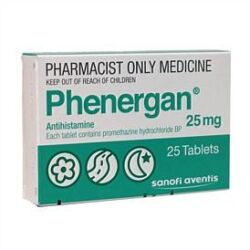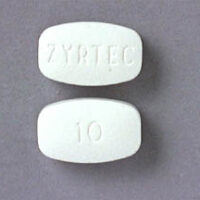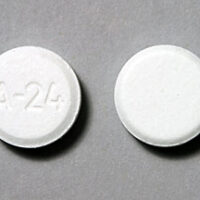Description
Drug Uses
Phenergan helps to reduce symptoms of different permanent and seasonal allergic rhinitis. Phenergan doesn’t work with asthmatic symptoms. Phenergan can be effective treating motion sickness. Consult your dctor and probably Betapace treatment will be successful in your case.
How Taken
Phenergan comes as a tablet to take by mouth. Try to take pills at the same time every day with or without food. Take two pills a day, one in the morning and another in the evening. Always finish the full course of treatment even if you feel better. The taking schedule can be adjusted by your doctor.
Warnings/Precautions
Before taking Phenergan, tell your doctor if you have had a heart attack, stroke, or life–threatening irregular heartbeats within the last six months; have a history of heart failure; have coronary artery disease; have angina; have high or low blood pressure; have liver problems; have kidney problems; have ever had blood problems, including sickle cell anemia or leukemia; have a bleeding disorder; have a stomach ulcer; have retinitis pigmentosa (an inherited condition of the eye. You may not be able to take Betapace, or you may require a dosage adjustment or special monitoring during treatment if you have any of the conditions listed above. Your doctor may prescribe a lower dose of this medication.
Missed Dose
If you happen to miss a dose take it as soon as you remember unless it’s time for another dose. Never double you dose.
Possible Side Effects
Like all medicines, Phenergan can cause some side effects. These effects are usually mild to moderate and usually don’t last longer than a few hours. Some of these side effects are more likely to occur with higher doses. The most common side effects of Betapace are headache, flushing of the face, and upset stomach. Phenergan can cause allergic reactions. Make sure to tell your doctor that you are allergic to any Phenergan components.
Storage
Keep Phenergan out of the reach of children. Keep Phenergan in its original container. Store at 25°C (77°F); excursions permitted to 15–30°C (59–86°F).
Overdose
If overdose is suspected, seek medical attention immediately. Symptoms of a Phenergan overdose are not known, but are likely to include chest pain, difficult breathing, dizziness, an irregular heartbeat, and swelling of the ankles or legs.
More Information
Report to you doctor of all medication you may use. Especially that goes to MAO inhibitors, some blood pressure drugs, digoxin, all adrenalin like drugs and other drugs that affect the heart rhythm. You should check all labels on nonprescription medication. Consult your doctor if any of the medicines you take contain antihistamines and decongestants. If you are about to have any allergy testing, stop talking Phenergan a couple of days before the tests, as it may affect test results. Before stopping or starting any medication you should get your doctors` or pharmacist approval.
Disclaimer
This drug information is for your information purposes only, it is not intended that this information covers all uses, directions, drug interactions, precautions, or adverse effects of your medication. This is only general information, and should not be relied on for any purpose. It should not be construed as containing specific instructions for any particular patient. We disclaim all responsibility for the accuracy and reliability of this information, and/or any consequences arising from the use of this information, including damage or adverse consequences to persons or property, however such damages or consequences arise. No warranty, either expressed or implied, is made in regards to this information.




Reviews
There are no reviews yet.